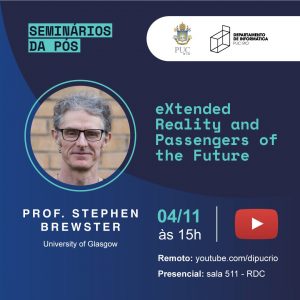 Amanhã, às 15h, acontecerá o seminário “eXtended Reality and Passengers of the Future”, proferido pelo professor de Interação Humano-Computador na Escola de Ciências da Computação da Universidade de Glasgow, Stephen Brewster.
Amanhã, às 15h, acontecerá o seminário “eXtended Reality and Passengers of the Future”, proferido pelo professor de Interação Humano-Computador na Escola de Ciências da Computação da Universidade de Glasgow, Stephen Brewster.
O evento ocorrerá na sala 511 do RDC, e será transmitido ao vivo, via Youtube pelo canal do DI através do link: https://www.youtube.com/watch?v=BNermcmnc8I
Resumo do seminário:
I will present our work into improving passenger journeys using immersive Virtual and Augmented Reality (together XR) to support entertainment, work and collaboration on the move. In Europe, people travel an average of 12,000km per year on private and public transport, in cars, buses, planes and trains. These journeys are often repetitive and wasted time. This total will rise with the arrival of fully autonomous cars, which free drivers to become passengers. The potential to recover this lost time is impeded by 3 significant challenges:
Confined spaces – These limit interactivity, and force us to rely on small displays such as phones or seatback screens
Social acceptability – We may share the space with others, inducing a pressure to conform, inhibiting technology use
Motion sickness – Many people get sick when they read or play games in vehicles. Once experienced, it can take hours for symptoms to resolve
XR headsets could allow passengers to use their travel time in new, productive ways, but only if these fundamental challenges can be overcome. Passengers would be able to use large virtual displays for productivity; escape the physical confines of the vehicle and become immersed in virtual experiences; and communicate with distant others through new embodied forms of communication.
I will discuss our solutions to these challenges, focusing on the visual aspects. We are: developing new interaction techniques for VR and AR that can work in confined, seated spaces; supporting safe, socially acceptable use of XR providing awareness of others and the travel environment; and overcoming motion sickness using multimodal countermeasures to support these novel immersive experiences.
Conheça o professor:
Stephen Brewster is a Professor of Human-Computer Interaction in the School of Computing Science at the University of Glasgow. He got his PhD in auditory interface design at the University of York. At Glasgow, he leads the Multimodal Interaction Group, which is very active and has a strong international reputation in HCI (http://mig.dcs.gla.ac.uk). His research focuses on multimodal HCI, or using multiple sensory modalities and control mechanisms (particularly audio, haptics and gesture) to create a rich, natural interaction between human and computer. His work has a strong experimental focus, applying perceptual research to practical situations. A long-term focus has been on mobile interaction and how we can design better user interfaces for users who are on the move. Other areas of interest include haptics, wearable devices and in-car interaction. He currently holds an ERC Advanced Grant in the area of AR/VR for passengers. He was a General Chair of CHI 2019 in Glasgow and has previously chaired MobileHCI, EuroHaptics and TEI. He is a member of the ACM SIGCHI Academy, an ACM Distinguished Speaker and a Fellow of the Royal Society of Edinburgh.


